Skilled workers replacing ornamental poles, fused bulbs
By M.T. Yogesh Kumar
Mysore/Mysuru: Works are underway at the Mysore Palace for Dasara illumination and this year, the Mysore Palace Board has assured that it will be a grand spectacle to go with the mood of a grand Dasara after a gap of two years.
Though the celebrations were muted in 2019 and 2020, the illumination took the cake as it was done in full glory, attracting tourists from far and wide to the City of Lights.
This year, the Chamundeshwari Electricity Supply Corporation (CESC) is planning a bigger and better illumination that promises to extend up to 125 kilometres (last year, it was 100 km). The city’s core heritage zone, commercial hubs, important roads and circles and junctions will be brightly lit and even the roadside trees will rim with light giving a dazzling look.
Even the Palace Board is planning to make special efforts for illumination and along with the Mysore Palace, it has taken up the illumination of the Parks surrounding the iconic structure. The Palace, built in the Indo- Sarcenic style, comes alive when it is illuminated with about 1 lakh incandescent bulbs.
The bulbs, fixed in a synchronised pattern, are switched on in one go to spread a golden hue on the century-old structure.
Faultless illumination
Speaking to Star of Mysore, Palace Board Deputy Director T.S. Subramanya said that for the illumination, preparations have already started and every year, a team of officers, electrical engineers, electricians and workers ensure proper and faultless illumination. The Palace illumination has rarely witnessed any malfunction.
“We have taken up the task of illuminating all the parks surrounding the Palace this time and there are over 160 ornamental poles inside the parks. Several of them have been worn out and are being repaired and painted in silver to retain their originality. Over 30 bulbs have fused and they will be replaced with ornamental lamps,” Subramanya said.
“There are over 25 poles that are 40-ft in height and on top of that there are five lightbulbs. All the fused bulbs will be replaced and scaffoldings have been erected to reach that height. This apart, inside the Palace, there are many exquisite chandeliers in the main Durbar Hall, Kalyana Mantap and Private Durbar Hall. Some of the bulbs have fused and power connections have been snapped. These need to be fixed, cleaned and the chandeliers will have to be restored to their original shape,” Subramanya added.
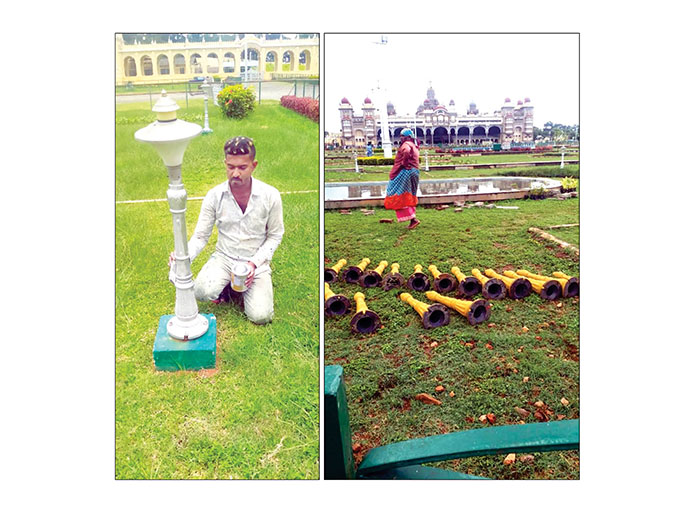
25,000 fused bulbs
The main Palace and all its gates (external illumination circuits) are connected to one lakh screw-type incandescent transparent bulbs. “From the Jayamarthanda Gate to the red light dome 147-ft high atop the Palace there are over 1 lakh incandescent bulbs on lamps that are fixed on teak wood. Over 25,000 bulbs have fused and we need to replace all of them. The challenge here is not the cost factor but the daunting task is to safely reach that height and replace the bulbs,” he said.
With the help of cranes and scaffoldings, skilled workers will replace the bulbs of all the gates that have been damaged, be it the Balarama Jayarama Gate, Varaha Gate, Jayamarthanda Gate, Bhramapuri Gate or the Karikallu Thotti Gate, he said.
Advance preparation and synchronisation
Teams prepare for the illumination task well in advance and we ensure synchronisation and continuous electricity flow in the circuit. There are four power sub-stations — different 11kV feeders connected to Mysore Palace Board Power Station — for power distribution and the red light atop the Palace in the central dome is used to synchronise the timing of lights.
Fifteen minutes before illumination we switch on the red light and then switch it off after 13 minutes. This is an alert to all station workers. Two minutes later when the red light is switched on again, the Palace is illuminated, Subramanya said. In the earlier years, the red light was an indicator of the presence of Maharaja inside the Palace.



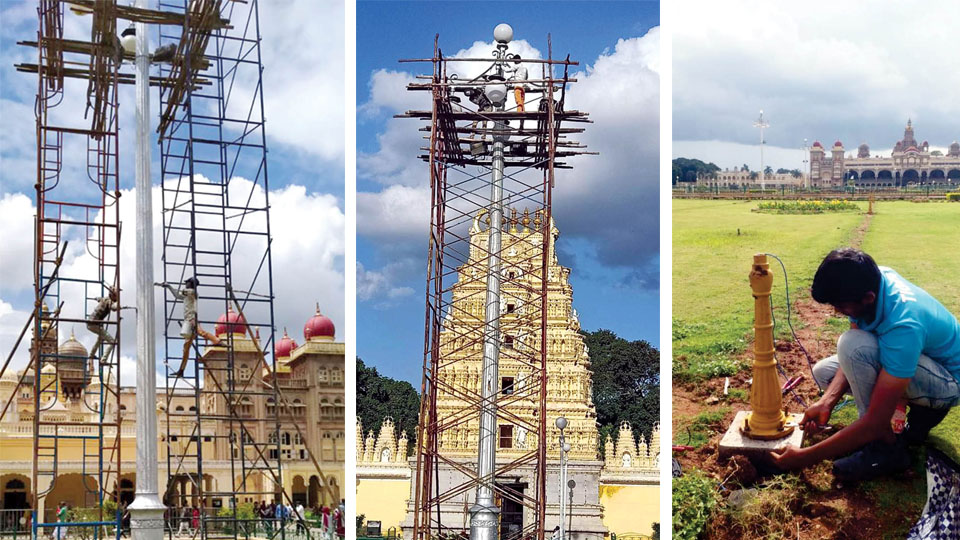
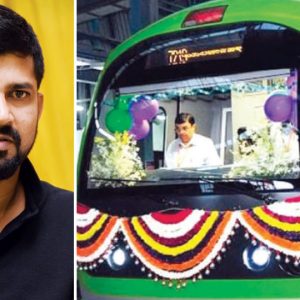
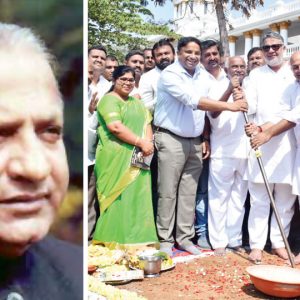
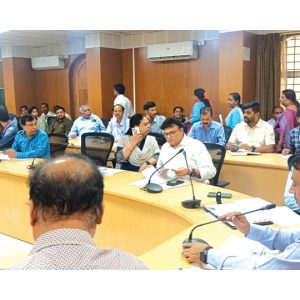
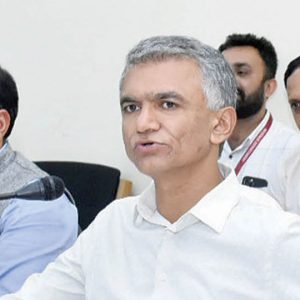
I was born and brought up in Mysore. Studied and worked there until by 1960s, this city became a filthy mass of people and pollution plus corruption taking over every where. I left the country.
The state government is milking money from tourists, so that the ministers and officials can pocket large sums of that money before retirement.
Hence, the name Nada Hubba, a means of sanctioning projects using this charade so that they get their 40%.
The British, having killed that Muslim thug Tipu Sultan, rescued the Wadiyar dynasty, and allowed them to continue as Maharajas, although every maharaja had to report to the Vice Roy of the day and his representative stationed in Bangalore.
The construction of this Palace and its lighting with series of bulbs were the luxuries these Maharajas enjoyed under the British rule. They had Durbars and the Dasaras. People of my parents’ generation had particular kind of nostalgia about Wadiyars. But, the real heroes were : Dewans like Seshadri Iyer who commissioned the Shivasamudram hydroelectric project , improved Bangalore through expansion and street lighting was followed by Sir MV who developed the state.
JC Wadiyar had no such Dewans, and the city never improved under him. Only journalists like Gouri Satya say differently, as they have their books to sell with exaggerated anecdotes and historical details.
Non-Mysoreans, as well as once Mysorean like Murthy of Infosys, got greedy by setting jup IT sweatshops taking coding work from US, using cheap IT techies compared to Western standards, and other Western companies, not happy destroying Bangalore, also destroyed this city. These IT techies try every day to flood the Western countries applying for work visas in hundreds of thousands,
Once you see this illumination, you have seen it all. The Chamundi Hill used to be a quiet place for Mysoreans to visit the Temple atop by climbing steps. Most shunned the Hill Road for the joy of exercise, the views of the city looking down at every 200 steps climbed, seeing the Nandi on the way. That was when the city population of just 30% of what it is now-in 1950s, the air was pure with petrol vehicles on the roads, footpaths were clean and one could take a walk from Chamundipuram to Yadavagiri circle, savouring the cool air and moderate Sun.
I do not see anything to celebrate, when this city is full of non-Mysoreans , and Kannada is not spoken in many extensions.
Now, people like @Kini want to sink this city further, by milking whatever money that they can get by way of so called tourism.
Once, the Chamundi Hill gets crumpled as a heap of earth and stones-with 5 years at most, this celebration will end.